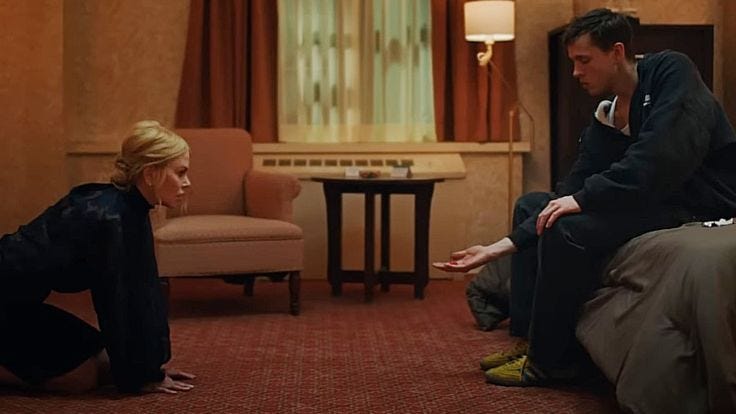When the trailer for Halina Reijn’s Babygirl (2024) first dropped, I came across it on TikTok out of all places, but the premise of Nicole Kidman —one of the most versatile actresses of our era, if you ask me— starring opposite Harris Dickinson —whom I’ve yet to watch more of, but his performance in The Iron Claw captured me enough to keep an eye out for his other projects— and what seemed like a slightly less questionable movie about kink (yes, I’m looking at both of you, 50 Shades and 365 Days franchises) was enough to make me keep an eye out for the release. But also, I’m just a bit of a pervert (sorry, Mom!).
Despite wanting to watch it in cinemas, the announcement for its release in my country came right at the time when it became available online —and since I couldn’t fathom watching it alongside strangers—, I had to resort to the betrayal that is streaming a film instead of supporting it in the box office. However, watching it in the privacy of my room made it a lot more digestible, even if I had to sleep on it and watch a TikTok that came across my For You Page (shoutout to Yourtvgirl, go watch her videos!) to get the discourse ball rolling.
If you’re not familiar with the movie, it’s marketed as an erotic thriller that follows Romy (Nicole Kidman), a CEO who puts her career and home life on the line when she starts an affair with a much younger intern, Samuel (Harris Dickinson). Looking back on it, I struggle to find the erotic thriller elements to it, beyond sneaking around to have kinky sex with your subordinate, but maybe I’m just too used to Adrian Lyne’s approach to the genre.
However, even though this is a 3.5-star and a like on Letterboxd for me, the truth of the matter is that it is a kink-related movie made for women, from a woman. No one else would capture the nuance of being ashamed of your desires and deciding to appease your counterpart than another woman, and that’s what Babygirl is really about to me. It’s a movie about liberation, about growing into your sexuality, and about overcoming shame.
Spoilers ahead!
Throughout the movie, we see Romy struggle to enjoy intimacy with her husband, Jacob (played by Antonio Banderas). Even though it’s easy to feel bad for the husband, as he embodies the Gen X rendition of a Gen Z nice guy, it becomes clear pretty soon that they’re just not on the same level of perversion. A very valid argument would be that after 19 years of marriage and not having orgasmed from her husband’s touch even once, there’s something to be discussed there. Nonetheless, when Romy tries to approach the subject of approaching sex as something a bit more… different, Jacob attempts it for .5 seconds and then backtracks because it feels too impersonal and weird to him (mind you, this woman goes through their sex as if it's a chore and then shamefully gets herself off to Daddy Dom porn in the adjacent room).
As women, we’re sadly taught to cater to men’s needs when it comes to sex. Mostly everything we know about it comes from porn —and anyone whose neurons synapse properly is aware of how unrealistic and harmful having porn as your encyclopedia is—. Although sad, it is not uncommon for women to have unfulfilling sex lives. Add that to the fact that Romy and Jacob were probably raised by a generation of people who strived to keep the peace in the household by keeping the husband happy (which makes me wonder when the phrase “Happy Wife, Happy Life” originated), and the fact that she excels in a line of work that is mostly associated with men (she’s in tech, he’s an artist), and you’d think there’s a clear power imbalance between them. While some could argue there is, this just doesn’t translate to their bedroom dynamic, where she’s craving to be taken care of instead of being the woman in charge, as she is in her daily life.
Her opportunity to “break free” comes in the form of a very emotionally attuned Samuel, who sees what she’s craving. Though slightly underdeveloped, we do get some glimpses of Samuel’s true nature. After their first meeting, he’s not the Daddy Dom she expects him to be —especially after he successfully manages to calm down an aggressive dog that isn’t his, and after his many overstepping remarks—, but he is willing to cater to her needs without asking for much in return, and truly (sorry Jacob!) that is a lot more than her husband gives her, at least in the bedroom.
While I don’t condone cheating and the fact that she put her life on the line just to get treated like a puppy, I do understand the heavy weight of a need being unmet for so long that you feel like you can’t focus on anything else but that. Sure, she’s great at her job, her husband is quite emotionally intelligent, and you could even say that her daughters are not that bad, but for someone as seemingly sexual as Romy, the fact that she’s not getting what she wants and needs when it comes to sex takes over a lot of space in her mind and life.
People underestimate compatibility in relationships. You can be extremely attracted to someone (physically, emotionally, mentally), and you can also love them dearly, but if there’s no chemistry, no rapport… then those other components fall flat (in my opinion).
I fear this is the case with Romy’s marriage. From what we see and what we’re told, Jacob is in no way a bad man, but he is a very simple one, and when it comes to sex, everything is done the way he wants it — and the way he wants it is strategic touching that leads to very simple, straightforward sex. And I’m sorry, but the essential disconnect in heterosexual sex begins with the fact that some (if not most) men like to skip the foreplay, while we (women) like the setup, the fantasy, and the build-up of it all.
When the confession of the affair comes, not only does Romy downplay what the experience meant to her and how much of her time and effort was put into it, but also there’s a component of unworthiness and insecurity to the way she approaches her sexuality and that is evidenced in her dialogue throughout this scene, “I was born like this”, “I just want to be normal”, “I want to be what you like. I want to be the woman you like” and the hints of trauma that she works through at the beginning of the film (EMDR therapy, and other ways of shocking her body and keeping it in shape: saunas, cold chambers, Botox).
Immediately, Jacob is disgusted, both by the betrayal and the fact that she risked it all to get her sexual needs met. To him, keeping the marriage and their home life intact was crucial. Still, also, the confession was a blow to his ego after he realized that this younger man could make his wife feel things he couldn’t in a nearly two-decade-long marriage (as evidenced by the scene where Samuel comforts Jacob).
The key element here is why Romy needs to be the girl of his dreams. Why do her desires, as unusual as they are, have to be shoved into a safe box deep inside of her, never to come out? Why does her husband begrudge her pleasure just because it comes in the form of a weirder practice? With Jacob, there’s always the need to perform and be what he likes, whereas her time with Samuel represents a respite from all the pretending and the repression. That’s why his odd but unwavering support means so much to Romy (I’m looking at you, hotel room scene).
In short, Babygirl is a necessary film. It forces us women to face the enormity of our desires and the necessity of discussing them beforehand. It is a raw and realistic representation of sexual exploration and acceptance, but also (in Romy’s case), compromise.
Instead of appeasing a man’s ego by faking an orgasm to avoid an uncomfortable moment or a vulnerable conversation, find yourself someone who will offer you treats and feed them off their hands without judging you (if that is what you want, of course).







